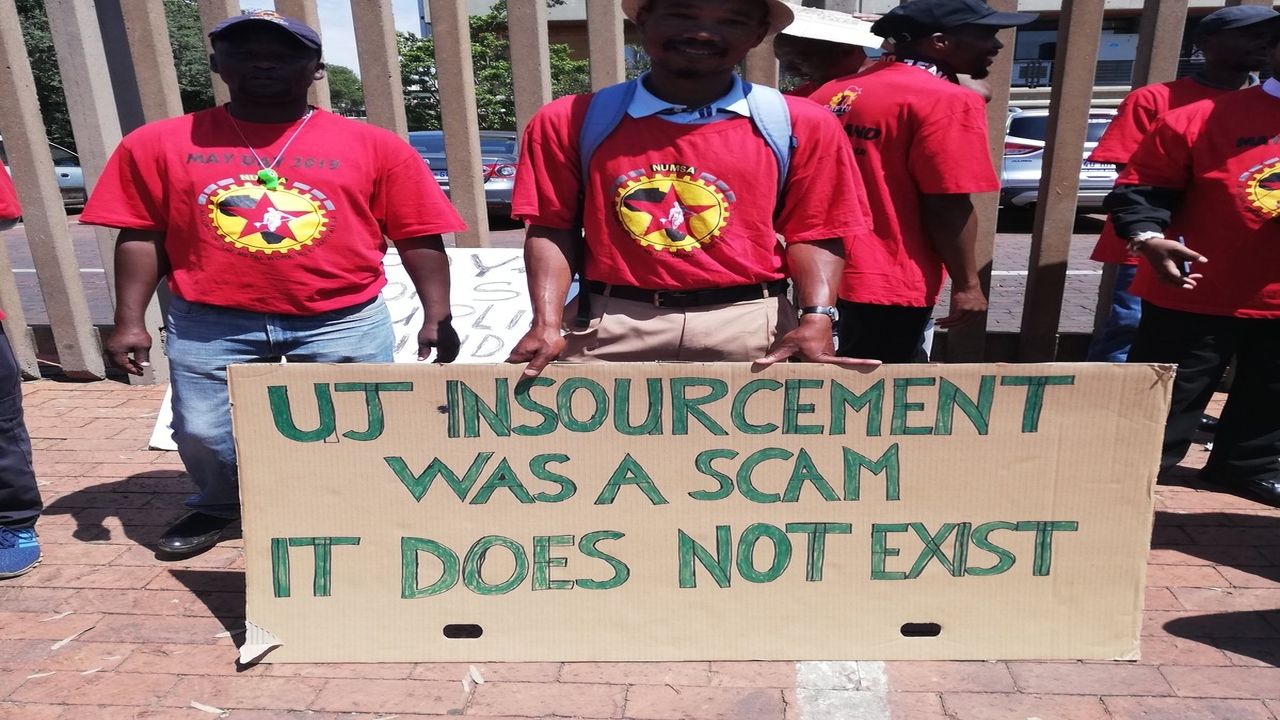Hundreds of workers of the University of Johannesburg (UJ) in South Africa, including security personnel and sanitation staff, have been on strike for 18 days over the university administration’s refusal to accept their demands for equal pay for equal work. The nearly 700 workers are represented by the National Union of Metalworkers of South Africa (NUMSA).
On October 18, NUMSA submitted a memorandum to Dr. Nolitha Vukuza, senior executive director at the office of the vice-chancellor. This memorandum – calling out the administration’s practice of forcing workers to work extra hours for no additional pay, and its refusal to pay the security staff for the work they do on Saturdays – was submitted after a march by the workers.
“Furthermore, the University of Johannesburg scammed the entire country when they claimed they were insourcing workers [in 2016],” the memorandum states. This claim was made by the university under the pressure of the #FeesMustFall movement led by students.
“The students put that issue on the agenda and forced management to insource them. We are grateful to them and their commitment to this cause,” Phakamile Hlubi Majola, national spokesperson of NUMSA, told Peoples Dispatch.
However, this supposed insourcing was a trick because those who were insourced in 2016 continue to earn less than those who were originally regarded as permanent employees. “[The formerly] outsourced workers are still earning a [monthly] basic of R5,000 ($333), whilst permanent staff earn a basic of R12,200 ($820),” she said.
This minimum difference of R7200 ($484) in wages persists despite the fact that those who were insourced in 2016 do the same kind of work, and for the same number of hours, as those hired as permanent employees.
Hlubi Majola also said that the insourced workers do not receive the same benefits. For instance, “workers who were formerly outsourced have to pay for their own medical aid with the university making a small contribution of only R200. Permanent staff get 100% contribution from the university,” she said.
This difference in pay and benefits is both a violation of the principle of ‘equal pay for work of equal value’, and also of the “the constitutional court judgement on Labour brokers which NUMSA won in 2018,” the memorandum states.
As per this judgement, any worker employed through a labor broker for an annual pay of R205,000 ($14,107) or less is eligible to acquire the status of a permanent employee after three months of work.
The judgement, the memorandum states, also makes it “clear that all workers who are insourced, upon becoming permanent, must receive the same benefits and salaries as other permanent staff.”
While the university maintains that its financial state does not allow it to meet the union’s demand for equal pay, NUMSA finds it “difficult to believe that narrative, because they are spending a lot of money on private companies, outsourcing workers to replace those who are on strike in an attempt to undermine the strike, instead of using that money to equalize salaries and benefits.”
Addressing the striking workers at the demonstration before the memorandum was submitted, NUMSA’s Regional Secretary of JC Bez, Oupa Ralake, said: “How is it possible that they can work so hard and be denied salaries which they deserve? All these employers are the same, it doesn’t matter if they are white or black. In this democracy of ours, we have a lot of black managers. But inside, they are white, and their hearts are like the racist Afrikaner ‘Boers’ we feared under apartheid.”
NUMSA will continue its strike action and picketing at the university premises until October 25, which is the deadline it has given to the university administration to respond to its demands.
This struggle against outsourcing and for equal pay has received solidarity not only from the student community and the academic staff in the university, but also from other countries. The Professional Staff Congress – a 30,000 members-strong union in City University of New York, US – which is itself involved in a struggle against the practice of labor brokering in its institution, has sent to NUMSA a letter of solidarity stating: “We admired your victory over insourcing in 2015, and we wish you good speed in this next step in the struggle for labor justice.”





